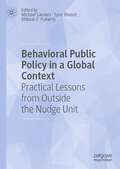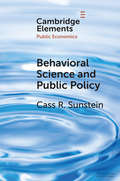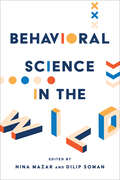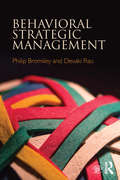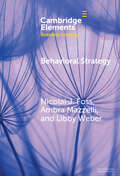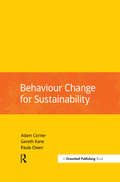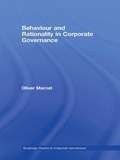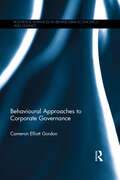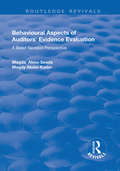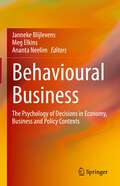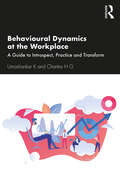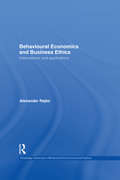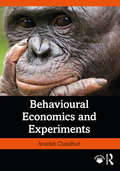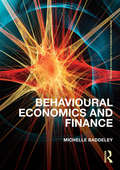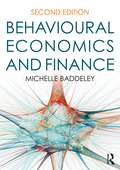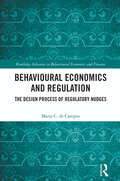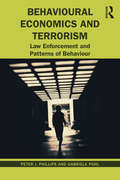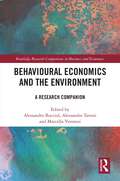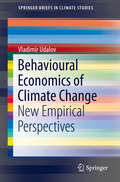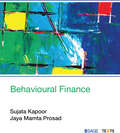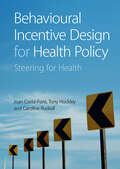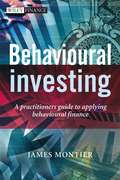- Table View
- List View
Behavioral Public Policy in a Global Context: Practical Lessons from Outside the Nudge Unit
by Michael Sanders Syon Bhanot Shibeal O' FlahertyThe academic field of behavioral science has developed rapidly in recent decades. The field draws on research from across the social and natural sciences, and it has consistently shown that humans are not always rational. This insight has had a profound impact on multiple fields, including economics, political science, and law. Since the early 2000s, the application of behavioral science to public policy has also grown exponentially. Policymakers and practitioners now regularly use behavioral science to rethink how they develop programs and solve social problems. The impact has been far-reaching; behavioral science has transformed how we think about the economy, public health, education, and beyond. In practice, behavioral insights have been used to raise tax revenues, help people access social welfare program benefits and employment opportunities, increase voter turnout, boost medication adherence, and more. There are now hundreds of entities – international organizations, governments, business, and nonprofits – building and investing in internal behavioral science teams. Unfortunately, most of the hard work of putting these teams together and applying behavioral science insights happens “behind the scenes.” This book unearths some of the stories and insights from pioneers in applied behavioral science, in their own words. How did their teams come about, and how did they grow? What projects have worked, and which have not? What have they learned, and what would they recommend to others seeking to build behavioral science teams of their own?
Behavioral Rationality and Heterogeneous Expectations in Complex Economic Systems
by Cars HommesRecognising that the economy is a complex system with boundedly rational interacting agents, the book presents a theory of behavioral rationality and heterogeneous expectations in complex economic systems and confronts the nonlinear dynamic models with empirical stylized facts and laboratory experiments. The complexity modeling paradigm has been strongly advocated since the late 1980s by some economists and by multidisciplinary scientists from various fields, such as physics, computer science and biology. More recently the complexity view has also drawn the attention of policy makers, who are faced with complex phenomena, irregular fluctuations and sudden, unpredictable market transitions. The complexity tools - bifurcations, chaos, multiple equilibria - discussed in this book will help students, researchers and policy makers to build more realistic behavioral models with heterogeneous expectations to describe financial market movements and macro-economic fluctuations, in order to better manage crises in a complex global economy.
Behavioral Science and Public Policy (Elements in Public Economics)
by Cass R. SunsteinBehavioral science is playing an increasing role in public policy, and it is raising new questions about fundamental issues - the role of government, freedom of choice, paternalism, and human welfare. In diverse nations, public officials are using behavioral findings to combat serious problems - poverty, air pollution, highway safety, COVID-19, discrimination, employment, climate change, and occupational health. Exploring theory and practice, this Element attempts to provide one-stop shopping for those who are new to the area and for those who are familiar with it. With reference to nudges, taxes, mandates, and bans, it offers concrete examples of behaviorally informed policies. It also engages the fundamental questions, include the proper analysis of human welfare in light of behavioral findings. It offers a plea for respecting freedom of choice - so long as people's choices are adequately informed and free from behavioral biases.
Behavioral Science in the Wild (Behaviorally Informed Organizations)
by Dilip Soman Nina MažarBehavioral Science in the Wild helps managers understand how best to incorporate key research findings to solve their own behavior change challenges in the real world – from lab to field. Behavioral Science in the Wild helps managers to implement research findings on behavioral change in their own workplace operations and to apply them to business or policy problems. As the second book in the Behaviourally Informed Organizations series, Behavioral Science in the Wild takes a step back to address the "why" and "how" behind the origins of behavioral insights, and how best to translate and scale behavioral science from lab-based research findings. Governments, for-profit enterprises, and welfare organizations have increasingly started relying on findings from the behavioral sciences to develop more accessible and user-friendly products, processes, and experiences for their end-users. While there is a burgeoning science that helps us to understand why people act and make the decisions that they do, and how their actions can be influenced, we still lack a precise science and strategic insights into how some key theoretical findings can be successfully translated, scaled, and applied in the field. Nina Mažar and Dilip Soman are joined by leading figures from both the academic and applied behavioral sciences to develop a nuanced framework for how managers can best translate results from pilot studies into their own organizations and behavior change challenges using behavioral science.
Behavioral Strategic Management (Theories Of Strategic Management Ser. #2)
by Philip Bromiley Devaki RauThis unique text examines strategic management and its implementation in the context of what we know about how individuals and organizations actually make decisions. Through this behavioral approach, students gain a richer, more realistic understanding of how to create coherent strategies that take advantage their strengths and build their capabilities. Integrating analytical tools found in a typical strategy textbook with cognitive and psychological insights into decision making, the book focuses on core issues that will help students understand the complexities inherent in making profitable decisions. Readers will learn about the purpose of organizations; consider how political, technological, and industry environments play into firm capabilities; how these capabilities are used in competition; and how to adapt strategies over time. The authors also cover important topics like managerial cognition, learning, and corporate strategy, which receive scant attention in other texts. Chapter summaries, experiential exercises, and "Food for Thought" boxes featuring plenty of discussion questions provide practical insight into how to utilize a successful strategy and maintain a consistent, long-term direction within a firm. Succinct and well-written, Behavioral Strategic Management offers graduate students of strategy a deeper and broader understanding of the topic.
Behavioral Strategy: Exploring Microfoundations of Competitive Advantage (Elements in Business Strategy)
by Nicolai J Foss Ambra Mazzelli Libby WeberBehavioral strategy has emerged as one of the most important currents in contemporary strategic management. But, what is it? Where does it come from? Why is it important? This Element provides a review of key streams in behavioral, interpreting behavioral strategy as a consistently microfoundational approach to strategy that is grounded in evidence-based insight in behaviors and interaction. We show that there is considerable room for furthering the microfoundations of behavioral strategy and point to research opportunities and methods that may realize this aim. The Element is of interest to strategy scholars in general, and to Ph.D. students in strategy research in particular.
Behaviour Change for Sustainability
by Adam Corner Gareth Kane Paula OwenBehaviour Change for Sustainability is a compilation of 3 bestselling sustainability guides that gathers together, in one place, a variety of effective tools and techniques for encouraging a lasting shift to sustainable behaviours in business and society. Promoting Sustainable Behaviour offers the definitive guide to building a sustainable behaviour campaign that works. By summarising "what really works" and pulling out the most important messages from the evidence base, this book contains all the tools you need to maximize the success of your sustainable behaviour initiative – in households, when commuting, in the workplace and beyond. Green Jujitsu outlines the smart way to embed sustainability within the culture of any organization, by working with employees' strengths and interests. Gareth Kane points out the hallmarks of unsuccessful approaches to cultural change, which are often confused, unimaginative or confrontational. He puts forward an alternative framework designed to play to people's strengths and interests and genuinely engage them in problem-solving. Gamification is fast emerging as a user engagement and behaviour change tool that succeeds where other tactics and strategies have failed. How Gamification Can Help Your Business Engage in Sustainability contains all the information businesses and other organizations need to make an informed decision about whether to adopt gamification as part of their own business and sustainability strategies – and the tools to get started.
Behaviour and Rationality in Corporate Governance (Routledge Studies In Corporate Governance Ser.)
by Oliver MarnetCorporate scandals due to bad accounting happen far too frequently for a system of corporate governance to be deemed effective. This book tells why the safeguards designed to prevent bad accounting so often fail. By studying why the auditors and members of a board of directors regularly fail to deliver the truth about a company‘s financ
Behavioural Approaches to Corporate Governance (Routledge Advances in Behavioural Economics and Finance)
by Cameron Elliott GordonCorporate governance failures are all too frequent and their patterns and outcomes seem avoidably familiar. This book examines the findings of behavioural finance and economics that are most relevant to governance problems, and suggests potential solutions that are best suited to real-world practice and circumstance. There is a great deal of existing theory that claims to predict the causes and effects of poor governance, and provide solutions. However, the implementation of such measures seems to do little more than merely delay inevitable crises. This book develops a synthesis framework to examine the relative strengths and weaknesses of a behavioural versus deductive approach to understanding the failures of governance. It concludes with a discussion of how corporate governance theory may need to shift going forward, perhaps to include a ‘heterodox’ ecosystem of theoretical paradigms. This book will be of interest to students, researchers and practitioners concerned with corporate governance, economic theory and behavioural economics.
Behavioural Aspects of Auditors' Evidence Evaluation: A Belief Revision Perspective
by Magda Abou-Seada Magdy Abdel-KaderThis title was first published in 2003. Based on psychological research, auditing studies have focused on 'belief revision' as a way of understanding how auditors evaluate evidence. Moreover a belief revision process is consistent with US auditing standards. UK standards on the other hand do not appear to give guidance on the process to follow when evaluating evidence. Research in the US indicates that auditors do in fact follow a belief revision process in accordance with US standards. Employing survey research (based on personal interviews with a number of experienced UK auditors) this book demonstrates how auditors prefer to be described as following the open mind approach. Building on the findings of the interviews the book then describes an experimental study to investigate the differences between the belief revision and open mind approaches in terms of their effect on the efficiency and effectiveness of the audit process. The book concludes that the belief revision approach would improve the efficiency of the audit process without affecting its effectiveness or outcomes.
Behavioural Business: The Psychology of Decisions in Economy, Business and Policy Contexts
by Janneke Blijlevens Meg Elkins Ananta NeelimThis book explores all aspects of the new and emerging area of behavioural business. This book identifies behavioural business as a powerful application of the latest insights and tools from psychology and behavioural science to decision-making in business, management and policy. This book uniquely positions behavioural business as different from both behavioural economics and psychology. This book instead applies a fresh focus on behavioural interventions in policy and business. This book introduces this new area and showcases what it contributes to a number of important contemporary business and policy issues. These include behavioural insights for managers in diverse and multi-cultural workplaces, designers of organisations, interventions, products and services, financial advisors, public policy makers, business creatives and entrepreneurs as well as charity and NGO practitioners. This book summarises state-of-the-art knowledge in the areas of expertise of the authors, who are members of the Behavioural Business Lab at RMIT University in Australia. This book will interest advanced students in related subjects as well as academics and policy makers hoping to learn and apply behavioural insights to their areas of expertise.
Behavioural Dynamics at the Workplace: A Guide to Introspect, Practice and Transform
by Umashankar K Charitra H GThis book offers strategies and effective ways for professional improvement in the workplace. It focuses on behavioural dynamics in a work environment, and offers perspectives on self-assessment, critical thinking, experiential learning, stress management and information processing. The book discusses concepts like self-image and self-concept which have been aligned with professional excellence and provides a psychoanalytic and theoretical understanding of organizational dynamics, individual and group behaviour, and the expectations of the contemporary corporate world. Through case studies, stories, helpful questionnaires and guides, the volume offers tools and practical solutions for young professionals to develop essential skills to thrive in their careers. It also highlights the importance of effective listening, communication, and identifying cognitive, behavioural and transpersonal patterns for professional and personal development. Insightful and detailed, the book is an essential read for students and professionals in the field of management, business communication, human resource, and behavioural psychology. It will also be of great use to young professionals working in various sectors who are interested in learning about organizational dynamics.
Behavioural Economics and Business Ethics: Interrelations and Applications (Routledge Advances In Behavioural Economics And Finance Ser. #1)
by Philip Alexander RajkoEconomics and moral philosophy have in recent years been considered to be distinct and separate fields. However, behavioural economics has started to reconcile various aspects of morality and economics, which has offered new conceptual opportunities to advance economics ethics and business ethics. This book aims to advance economic ethics and business ethics by combining normative principles and empirical evidence grounded on the key motivational forces in economic decision making. It has three core objectives: to assess order ethics as a theory of both economic ethics and business ethics, using behavioural economics methods and evidence; to identify cardinal virtues for modern business ethics; to to set up valuable guidelines for the implementation of economic ethics and business ethics.
Behavioural Economics and Experiments
by Ananish ChaudhuriBehavioural Economics and Experiments addresses key topics within behavioural economics, exploring vital questions around decision-making and human nature. Assuming no prior knowledge of economics, the book features wide-ranging examples from literature, film, sport, neuroscience and beyond. Ananish Chaudhuri explores the complex relationships between human behaviour, society and decision-making, introducing readers to the latest work on heuristics, framing and anchoring, as well as ideas around fairness, trust and social norms. The book offers a fresh perspective on issues such as: Decision-making under uncertainty Firms’ pricing decisions Employment contracts Coordination failures in organizations Preventing bubbles in financial markets This is an ideal introduction for students of behavioural economics, experimental economics and economic decision-making on economics, public policy, psychology and business-related programmes, and will also be accessible to policymakers and curious laymen.
Behavioural Economics and Finance
by Michelle BaddeleyStandard models in economics and finance usually assume that people are rational, self-interested maximisers, effectively co-ordinated via the invisible hand of the price mechanism. Whilst these approaches produce tractable, simple models, they cannot fully capture the uncertainties and instabilities that affect everyday choices in today’s complex world. Insights from the other social and behavioural sciences can help to fill the gap and behavioural economics is the subject which brings economics and finance together with psychology, neuroscience and sociology. Behavioural Economics and Finance introduces the reader to some of the key concepts and insights from this rich, inter-disciplinary approach to real-world decision-making.
Behavioural Economics and Finance (Routledge Advanced Texts In Economics And Finance Ser.)
by Michelle BaddeleyBehavioural economics and behavioural finance are rapidly expanding fields that are continually growing in prominence. While orthodox economic models are built upon restrictive and simplifying assumptions about rational choice and efficient markets, behavioural economics offers a robust alternative using insights and evidence that rest more easily with our understanding of how real people think, choose and decide. This insightful textbook introduces the key concepts from this rich, interdisciplinary approach to real-world decision-making. This new edition of Behavioural Economics and Finance is a thorough extension of the first edition, including updates to the key chapters on prospect theory; heuristics and bias; time and planning; sociality and identity; bad habits; personality, moods and emotions; behavioural macroeconomics; and well-being and happiness. It also includes a number of new chapters dedicated to the themes of incentives and motivations, behavioural public policy and emotional trading. Using pedagogical features such as chapter summaries and revision questions to enhance reader engagement, this text successfully blends economic theories with cutting-edge multidisciplinary insights. This second edition will be indispensable to anyone interested in how behavioural economics and finance can inform our understanding of consumers’ and businesses’ decisions and choices. It will appeal especially to undergraduate and graduate students but also to academic researchers, public policy-makers and anyone interested in deepening their understanding of how economics, psychology and sociology interact in driving our everyday decision-making.
Behavioural Economics and Regulation: The Design Process of Regulatory Nudges (Routledge Advances in Behavioural Economics and Finance)
by Maria C. de CamposIn recent years, the idea of "nudges" – small changes in individual choice architecture that do not involve incentives or coercion – has entered policy discourse and practice to address various problems ranging from energy usage to retirement savings. However, how nudges can be incorporated into regulatory practice, and whether the experimental methodologies used to design nudges are still appropriate when they are being used as a regulatory instrument is still an unexplored issue. As this book shows, the translation of ideas into the world of regulation is not so simple and straightforward. By analysing the different experimental alternatives that regulators can use when designing nudges and through a close analysis of a real-world example – the case of the European Union tobacco warnings – this book proposes an alternative design process more in tune with the reality of regulation. The book explores the implications of iterative experimental methodologies and processes for regulators, concluding with a call for an alternative nudging’s design process tailored to the regulatory space. This book is crucial for researchers and policy-makers interested in the incorporation of nudging into regulation and anyone interested in the implications of behavioural economics – and evidence more generally – for regulatory design.
Behavioural Economics and Terrorism: Law Enforcement and Patterns of Behaviour
by Peter J. Phillips Gabriela PohlBehavioural Economics and Terrorism can be used as a guide to help us think about thinking and, in doing so, to appreciate the deep quirkiness of human behaviour. Each day, people draw on their understanding of human behaviour. This takes place subconsciously for the most part but as situations become more complex it becomes necessary to think more deliberately about how people make their decisions. This book can be used to better understand human action in such contexts. In the high-stakes world of counter-terrorism, every angle of advantage is critical. From terrorists’ operational choices to the way that information flows through intelligence agencies, the book explains the patterns of behaviour that systematically shape human decision-making, for good and for bad. Decision-makers’ use of reference points, their loss aversion, overconfidence, goals and aspirations all shape their choices under conditions of risk and uncertainty. This book helps to shed light on how to use these concepts (and more) to develop deeper insights into the way in which terrorists think about their attack methods and targets.
Behavioural Economics and the Environment: A Research Companion (Routledge Research Companions in Business and Economics)
by Alessandro BucciolHumans have long neglected to fully consider the impact of their behaviour on the environment. From excessive consumption of fossil fuels and natural resources to pollution, waste disposal, and, in more recent years, climate change, most people and institutions lack a clear understanding of the environmental consequences of their actions. The new field of behavioural environmental economics seeks to address this by applying the framework of behavioural economics to environmental issues, thereby rationalizing unexplained puzzles and providing a more realistic account of individual behaviour. This book provides a complete and rigorous overview of environmental topics that may be addressed and, in many instances, better understood by integrating a behavioural approach. This volume features state-of-the-art research on this topic by influential scholars in behavioural and environmental economics, focussing on the effects of psychological, social and cognitive factors on the decision-making process. It presents research performed using different methods and data collection mechanisms (e.g. laboratory experiments, field experiments, natural experiments, online surveys) on a variety of environmental topics (e.g. sustainability, natural resources). This book is a comprehensive and innovative tool for researchers and students interested in the behavioural economics of the environment and in the design of policy interventions aimed at reducing the human impact on the environment.
Behavioural Economics of Climate Change: New Empirical Perspectives (Springerbriefs In Climate Studies)
by Vladimir UdalovThis book investigates various kinds of climate change mitigation behaviour, which range from a general support of environmental policy to concrete energy-saving activities, in selected countries. Drawing on extensive national and international survey data, the analysis has the following main objectives: to identify potential determinants of individuals’ renewable energy support, and to analyse the impact of experiences with natural disasters on individuals’ choice between economic growth and environmental protection. Moreover, it examines the role of environmental motivations behind direct daily energy-saving behaviour. The empirical results reveal that various types of climate change mitigation behaviour are not only driven by a mixture of environmental and non-environmental/economic motivations but also depend on external circumstances such as natural disasters. Since CO2 emission dynamics stem to some extent from the choices people make every day in their roles as consumers, investors and citizens, the new findings presented are also valuable from a policy perspective.
Behavioural Finance
by Sujata Kapoor Jaya Mamta ProsadA comprehensive and well-structured textbook that provides a concrete foundation of the most essential elements of behavioural finance and related biases in a simple manner. Designed as a core textbook for the students of finance, Behavioural Finance discusses the theoretical concepts of investment behaviour in the dynamic environment of financial markets. It explains the role and impact of psychological biases and sociological influences underlying the financial behaviour of both individual and institutional investors. Through the use of case studies and real-life examples, primarily from emerging economies like India, the book explores the psychology of individual investors and market experts such as financial analysts and portfolio managers. It discusses how key market players make decisions and shows that every behavioural inconsistency can cumulate to market anomalies. The highlight of this book is the inclusion of contemporary issues such as the role of weather, emotional state of mind, religion and culture in investment decisions and the emphasis on upcoming areas in this discipline such as neurofinance and emotional finance. Key Features • Focuses on both past and contemporary research findings to simplify theories and concepts • Provides psychological insights to investors and practitioners to identify their biases in financial decision-making process • Module-based chapterization for better understanding of concepts
Behavioural Incentive Design for Health Policy: Steering for Health
by Joan Costa-Font Tony Hockley Caroline RudisillBehavioural economics has become a popular way of tackling a broad range of issues in public policy. By presenting a more descriptive and possibly accurate representation of human behaviour than traditional economics, Behavioural Incentive Design for Health Policy tries to make sense of decisions that follow a wider conception of welfare, influenced by social norms and narratives, pro-social motivations and choice architectures which were generally neglected by standard economics. The authors show how this model can be applied to tackle a wide range of issues in public health, including smoking, the obesity crisis, exercise uptake, alcoholism, preventive screenings and attitudes towards vaccinations. It shows not only how behavioural economics allows us to better understand such challenges, but also how it can design effective incentives for addressing them. This book is an extensive reassessment of the interaction between behavioural incentives and health.
Behavioural Insights Team (A)
by Michael Luca Patrick RooneyThe Behavioural Insights Team case introduces students to the concept of choice architecture and the value of experimental methods (sometimes called A/B testing) within organizational contexts. The exercise provides an opportunity for students to apply these principles to solve a managerial problem - increasing tax compliance rates among delinquent taxpayers. Students are asked to rewrite the letter that the UK tax department (HMRC) sends to delinquent taxpayers; this exercise is based on a successful behavioral field experiment run by the UK government.
Behavioural Investing
by James MontierBehavioural investing seeks to bridge the gap between psychology and investing. All too many investors are unaware of the mental pitfalls that await them. Even once we are aware of our biases, we must recognise that knowledge does not equal behaviour. The solution lies is designing and adopting an investment process that is at least partially robust to behavioural decision-making errors. Behavioural Investing: A Practitioner's Guide to Applying Behavioural Finance explores the biases we face, the way in which they show up in the investment process, and urges readers to adopt an empirically based sceptical approach to investing. This book is unique in combining insights from the field of applied psychology with a through understanding of the investment problem. The content is practitioner focused throughout and will be essential reading for any investment professional looking to improve their investing behaviour to maximise returns. Key features include: The only book to cover the applications of behavioural finance An executive summary for every chapter with key points highlighted at the chapter start Information on the key behavioural biases of professional investors, including The seven sins of fund management, Investment myth busting, and The Tao of investing Practical examples showing how using a psychologically inspired model can improve on standard, common practice valuation tools Written by an internationally renowned expert in the field of behavioural finance
